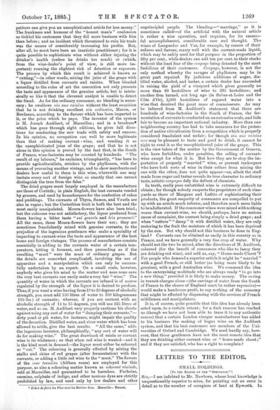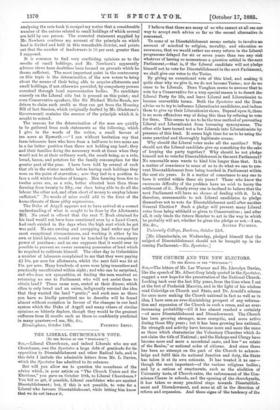LETTERS TO THE EDITOR.
SMALL HOLDINGS.
[To THZ EDITOR OF THY " EPECTLTOR."1 SIR,—I am indebted to Mr. Newborn, whose local knowledge is unquestionably superior to mine, for pointing out an error in detail as to the number of occupiers of land at Epworth. In
analysing the rate-book it escaped my notice that a considerable number of the entries related to small holdings of which several are held by one person. The corrected statement supplied by Mr. Newborn confirms my account of the principle on which land is divided and held in this remarkable district, and points out that the number of landowners is 50 per cent. greater than I supposed.
It is common to find very conflicting opinions as to the results of small holdings, and Mr. Newborn's apparently adverse views have doubtless been formed on grounds which he deems sufficient. The most important point in the controversy on this topic is the determination of the new voters to bring about the means of their being able to acquire allotments and small holdings, if not otherwise provided, by compulsory powers exercised through local representative bodies. 'No candidate scarcely on the Liberal side but is pressed on -this point ; and even Conservative speakers, like Sir Michael Hicks-Beach, are driven to claim such credit as they can get from the Housing Bill of last Session, which (originally drafted by Mr. Gladstone's Government) contains the essence of the principle which it is sought to extend.
The reasons for the determination of the men are quickly to be gathered from such statements as the following, which I give in the words of the writer, a small farmer of ten acres at Epworth :—" I can without hesitation say that farm-labourers here who have from a half-acre to two acres are in a far better position than those not holding any land ; they and their families doing the necessary work at times when they would not be at their ordinary work, the result being, as a rule, bread, bacon, and potatoes for the family consumption for the greater part of the year. I have been told by several of such that oft in the winter months before having such holdings they were on the point of starvation ; now they feel in a position to face a cold winter fearless of hunger. Men farming from five to twelve acres are, as a rule, better situated here than those farming from twenty to fifty, one class being able to do all the labour, the other not, and often short of money to employ labour sufficient." No words of mine could add to the force of the home-thrusts of these pithy expressions.
The Duke of Argyll appears not to have arrived at a correct understanding of what is sought to be done by the Allotments Bill. No proof is offered that the rent T. Bush obtained for his land would not have been sanctioned even by a Land Court, had such existed in the days when the high rent which he got was paid. No one owning and occupying land under any but most exceptional circumstances, and working it either by his own or hired labour, would ever be touched by the compulsory power of purchase ; and no one supposes that it would ever be possible to prevent an owner resuming possession of land which he required to cultivate himself. The other day in Oxfordshire a number of labourers complained to me that they were paying 22 10s, per acre for allotments, whilst the next field was let at 15s. per acre. Many hundreds of acres were lying tenantless and practically uncultivated within sight ; and who can be surprised, and who does not sympathise, at finding the men resolved on returning no one to Parliament who will not assist them to obtain land ? These same men, seated at their dinner, which often is only bread and an onion, indignantly scouted the idea that they wanted the land "gratis ;" and such men as those you have so kindly permitted me to describe will be found almost without exception in favour of the changes in our land system which the Duke of Argyll and many others of similar opinions so bitterly deplore, though they would be the greatest sufferers from ill results such as those so confidently predicted in many quarters.—I am, Sir, ttc., Birmingham, October 15th. FREDERIC IMPEY.



































 Previous page
Previous page